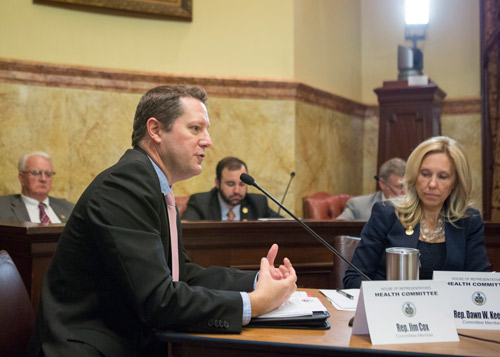May. 14, 2019

HARRISBURG – The state House Health Committee today approved legislation introduced by state Rep. Jim Cox (R-Berks/Lancaster) that would help health care professionals identify and treat patients who previously overdosed on opioids.
“In the fight against opioid abuse, one of the greatest tools our health care professionals have is information,” Cox said. “Knowing a patient’s history can mean the difference between life and death.”
Cox’s bill would require first responders and hospital personnel to record the use of Narcan, Naloxone or any other opioid overdose agent in the patient’s record in a state database.
Narcan and Naloxone are medications designed to rapidly reverse an opioid overdose.
Pennsylvania in 2014 enacted a law creating a state database to track opioid prescriptions. Cox’s bill would ensure the use of Narcan and Naloxone would show up on a patient’s record in that database.
“If a doctor knows a patient received Narcan or Naloxone, that can open the door for a conversation about opioid abuse, addiction and recovery,” Cox said. “If the doctor doesn’t know the patient overdosed and received the medication, that conversation may never happen and the patient may continue down the dark road of addiction. This bill is about saving lives and preventing the heartache that accompanies the death of a loved one due to an opioid overdose.”
Cox’s
House Bill 1005 now heads to the full House for consideration.
More information about Cox is available on his website at
RepJimCox.com or by following him on Facebook at
Facebook/RepJimCox.
Representative Jim Cox
129th District
Pennsylvania House of Representatives
Media Contact: Daniel Massing
717.772.9845
dmassing@pahousegop.com
RepJimCox.com /
Facebook.com/RepJimCox

State Rep. Jim Cox fielded questions Monday morning from his colleagues on the House Health Committee about his bill to track the use of life-saving opioid overdose reversal drugs in a state database. The committee approved the bill, which Cox says will help health care professionals identify when their patients have overdosed on opioid medications.